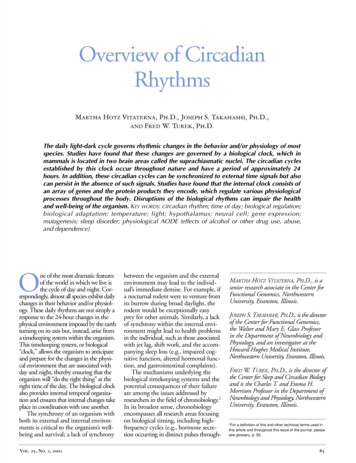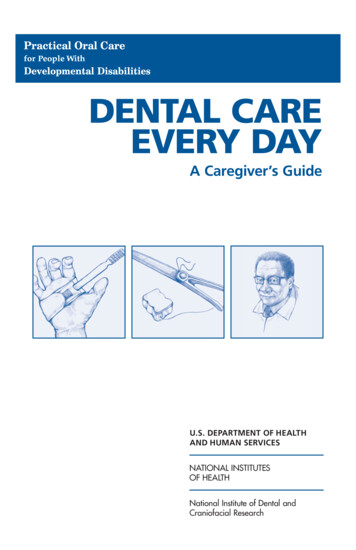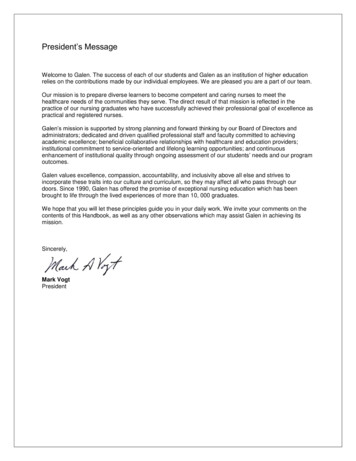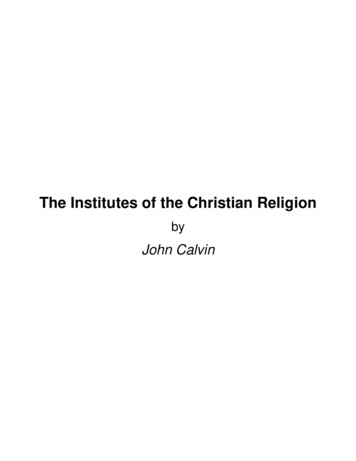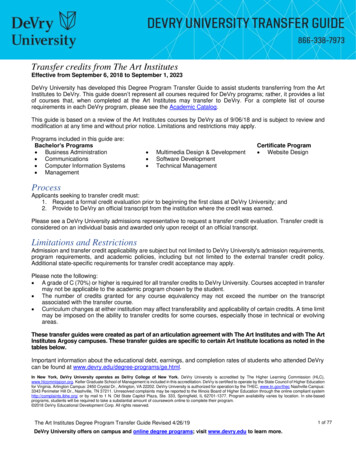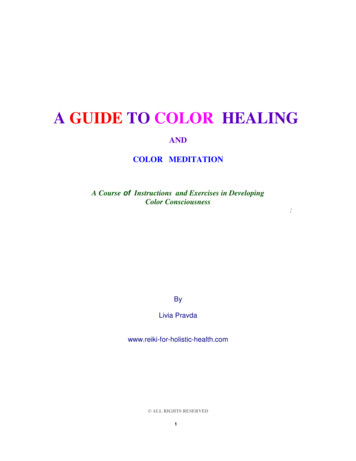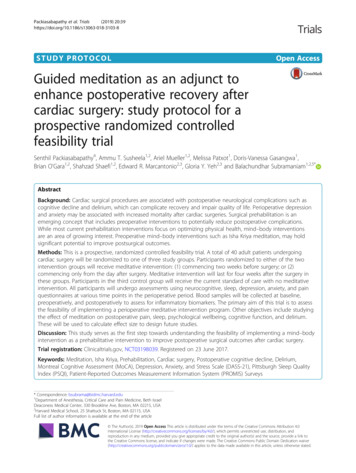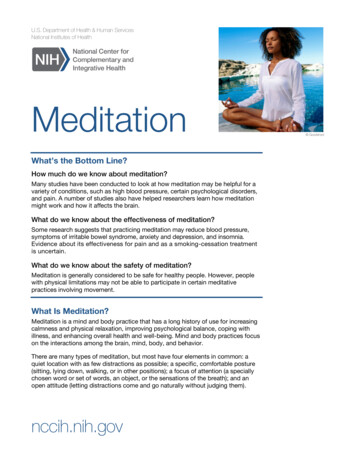
Transcription
U.S. Department of Health & Human ServicesNational Institutes of HealthMeditationWhat’s the Bottom Line?How much do we know about meditation?Many studies have been conducted to look at how meditation may be helpful for avariety of conditions, such as high blood pressure, certain psychological disorders,and pain. A number of studies also have helped researchers learn how meditationmight work and how it affects the brain.What do we know about the effectiveness of meditation?Some research suggests that practicing meditation may reduce blood pressure,symptoms of irritable bowel syndrome, anxiety and depression, and insomnia.Evidence about its effectiveness for pain and as a smoking-cessation treatmentis uncertain.What do we know about the safety of meditation?Meditation is generally considered to be safe for healthy people. However, peoplewith physical limitations may not be able to participate in certain meditativepractices involving movement.What Is Meditation?Meditation is a mind and body practice that has a long history of use for increasingcalmness and physical relaxation, improving psychological balance, coping withillness, and enhancing overall health and well-being. Mind and body practices focuson the interactions among the brain, mind, body, and behavior.There are many types of meditation, but most have four elements in common: aquiet location with as few distractions as possible; a specific, comfortable posture(sitting, lying down, walking, or in other positions); a focus of attention (a speciallychosen word or set of words, an object, or the sensations of the breath); and anopen attitude (letting distractions come and go naturally without judging them).nccih.nih.gov Goodshoot
National Center for Complementary and Integrative HealthMeditationWhat the Science Says About the Effectiveness of MeditationMany studies have investigated meditation for different conditions, and there’sevidence that it may reduce blood pressure as well as symptoms of irritable bowelsyndrome and flare-ups in people who have had ulcerative colitis. It may easesymptoms of anxiety and depression, and may help people with insomnia.Pain— Research about meditation’s ability to reduce pain has produced mixed results.However, in some studies scientists suggest that meditation activates certainareas of the brain in response to pain.— A small 2016 study funded in part by the National Center for Complementary andIntegrative Health (NCCIH) found that mindfulness meditation does help to controlpain and doesn’t use the brain’s naturally occurring opiates to do so. Thissuggests that combining mindfulness with pain medications and otherapproaches that rely on the brain’s opioid activity may be particularly effective forreducing pain. Visit the NCCIH Web site for more information on this study.— In another 2016 NCCIH-funded study, adults aged 20 to 70 who had chronic lowback pain received either mindfulness-based stress reduction (MBSR) training,cognitive-behavioral therapy (CBT), or usual care. The MBSR and CBT participantshad a similar level of improvement, and it was greater than those who got usualcare, including long after the training ended. The researchers found that participantsin the MBSR and CBT groups had greater improvement in functional limitationand back pain at 26 and 52 weeks compared with those who had usual care.There were no significant differences in outcomes between MBSR and CBT. Visitthe NCCIH Web site for more information on this study.High Blood Pressure— Results of a 2009 NCCIH-funded trial involving 298 university students suggestthat practicing Transcendental Meditation may lower the blood pressure ofpeople at increased risk of developing high blood pressure.— The findings also suggested that practicing meditation can help withpsychological distress, anxiety, depression, anger/hostility, and coping ability.— A literature review and scientific statement from the American Heart Associationsuggest that evidence supports the use of Transcendental Meditation (TM) tolower blood pressure. However, the review indicates that it’s uncertain whetherTM is truly superior to other meditation techniques in terms of blood-pressurelowering because there are few head-to-head studies.Irritable Bowel Syndrome— The few studies that have looked at mindfulness meditation training for irritablebowel syndrome (IBS) found no clear effects, the American College ofGastroenterology stated in a 2014 report. But the authors noted that given thelimited number of studies, they can’t be sure that IBS doesn't help.— Results of a 2011 NCCIH-funded trial that enrolled 75 women suggest that practicingmindfulness meditation for 8 weeks reduces the severity of IBS symptoms.— A 2013 review concluded that mindfulness training improved IBS patients’ painand quality of life but not their depression or anxiety. The amount of improvementwas small.2
National Center for Complementary and Integrative HealthMeditationUlcerative Colitis— In a 2014 pilot study, 55 adults with ulcerative colitis in remission were dividedinto two groups. For 8 weeks, one group learned and practiced mindfulnessbased stress reduction (MBSR) while the other group practiced a placeboprocedure. Six and twelve months later, there were no significant differencesbetween the two groups in the course of the disease, markers of inflammation, orany psychological measure except perceived stress during flare-ups. Theresearchers concluded that MBSR might help people in remission from moderateto moderately severe disease—and maybe reduce rates of flare-up from stress.Anxiety, Depression, and Insomnia— A 2014 literature review of 47 trials in 3,515 participants suggests thatmindfulness meditation programs show moderate evidence of improving anxietyand depression. But the researchers found no evidence that meditation changedhealth-related behaviors affected by stress, such as substance abuse and sleep.— A 2012 review of 36 trials found that 25 of them reported better outcomes forsymptoms of anxiety in the meditation groups compared to control groups.— In a small, NCCIH-funded study, 54 adults with chronic insomnia learnedmindfulness-based stress reduction (MBSR), a form of MBSR specially adaptedto deal with insomnia (mindfulness-based therapy for insomnia, or MBTI), or aself-monitoring program. Both meditation-based programs aided sleep, withMBTI providing a significantly greater reduction in insomnia severity comparedwith MBSR.Smoking Cessation— The results of 13 studies of mindfulness-based interventions for stopping smokinghad promising results regarding craving, smoking cessation, and relapse prevention,a 2015 research review found. However, the studies had many limitations.— Findings from a 2013 review suggest that meditation-based therapies may helppeople quit smoking; however, the small number of available studies is insufficientto determine rigorously if meditation is effective for this.— A 2011 trial comparing mindfulness training with a standard behavioral smokingcessation treatment found that individuals who received mindfulness trainingshowed a greater rate of reduction in cigarette use immediately after treatmentand at 17-week follow-up.— Results of a 2013 brain imaging study suggest that mindful attention reduced thecraving to smoke, and also that it reduced activity in a craving-related region ofthe brain.— However, in a second 2013 brain imaging study, researchers observed that a2-week course of meditation (5 hours total) significantly reduced smoking,compared with relaxation training, and that it increased activity in brain areasassociated with craving.Other Conditions— Results from a 2011 NCCIH-funded study of 279 adults who participated in an8-week Mindfulness-Based Stress Reduction (MBSR) program found that changesin spirituality were associated with better mental health and quality of life.— Guidelines from the American College of Chest Physicians published in 2013suggest that MBSR and meditation may help to reduce stress, anxiety, pain, anddepression while enhancing mood and self-esteem in people with lung cancer.3
National Center for Complementary and Integrative HealthMeditation— Clinical practice guidelines issued in 2014 by the Society for Integrative Oncology(SIC) recommend meditation as supportive care to reduce stress, anxiety,depression, and fatigue in patients treated for breast cancer. The SIC alsorecommends its use to improve quality of life in these people.— Meditation-based programs may be helpful in reducing common menopausalsymptoms, including the frequency and intensity of hot flashes, sleep and mooddisturbances, stress, and muscle and joint pain. However, differences in studydesigns mean that no firm conclusions can be drawn.— Because only a few studies have been conducted on the effects of meditation forattention deficit hyperactivity disorder (ADHD), there isn’t sufficient evidence tosupport its use for this condition.— A 2014 research review suggested that mind and body practices, includingmeditation, reduce chemical identifiers of inflammation and show promise inhelping to regulate the immune system.— Results from a 2013 NCCIH-supported study involving 49 adults suggest that 8weeks of mindfulness training may reduce stress-induced inflammation betterthan a health program that includes physical activity, education about diet, andmusic therapy.Meditation and the BrainSome research suggests that meditation may physically change the brain and body andcould potentially help to improve many health problems and promote healthy behaviors.— In a 2012 study, researchers compared brain images from 50 adults who meditateand 50 adults who don’t meditate. Results suggested that people who practicedmeditation for many years have more folds in the outer layer of the brain. Thisprocess (called gyrification) may increase the brain’s ability to process information.— A 2013 review of three studies suggests that meditation may slow, stall, or evenreverse changes that take place in the brain due to normal aging.— Results from a 2012 NCCIH-funded study suggest that meditation can affectactivity in the amygdala (a part of the brain involved in processing emotions), andthat different types of meditation can affect the amygdala differently even whenthe person is not meditating.— Research about meditation’s ability to reduce pain has produced mixed results.However, in some studies scientists suggest that meditation activates certainareas of the brain in response to pain.What the Science Says About Safety and Side Effectsof Meditation— Meditation is generally considered to be safe for healthy people.— People with physical limitations may not be able to participate in certainmeditative practices involving movement. People with physical health conditionsshould speak with their health care providers before starting a meditativepractice, and make their meditation instructor aware of their condition.— There have been rare reports that meditation could cause or worsen symptoms inpeople with certain psychiatric problems like anxiety and depression. People withexisting mental health conditions should speak with their health care providersbefore starting a meditative practice, and make their meditation instructor awareof their condition.4
National Center for Complementary and Integrative HealthMeditationNCCIH-Funded ResearchNCCIH-supported studies are investigating meditation for:— Teens experiencing chronic, widespread pain, such as from fibromyalgia— Stress reduction for people with multiple sclerosis— Post-traumatic stress disorder, headaches, reducing blood pressure.More to Consider— Don’t use meditation to replace conventional care or as a reason to postponeseeing a health care provider about a medical problem.— Ask about the training and experience of the meditation instructor you are considering.— Tell all your health care providers about any complementary or integrative healthapproaches you use. Give them a full picture of what you do to manage yourhealth. This will help ensure coordinated and safe care.For More InformationNCCIH ClearinghouseThe NCCIH Clearinghouse provides information on NCCIH and complementary andintegrative health approaches, including publications and searches of Federaldatabases of scientific and medical literature. The Clearinghouse does not providemedical advice, treatment recommendations, or referrals to practitioners.Toll-free in the U.S.: 1-888-644-6226TTY (for deaf and hard-of-hearing callers): 1-866-464-3615Web site: nccih.nih.govE-mail: info@nccih.nih.govPubMed A service of the National Library of Medicine (NLM), PubMed contains publicationinformation and (in most cases) brief summaries of articles from scientific andmedical journals. For guidance from NCCIH on using PubMed, see How To FindInformation About Complementary Health Approaches on PubMed.Web site: www.ncbi.nlm.nih.gov/pubmedNIH Clinical Research Trials and YouThe National Institutes of Health (NIH) has created a Web site, NIH Clinical ResearchTrials and You, to help people learn about clinical trials, why they matter, and howto participate. The site includes questions and answers about clinical trials,guidance on how to find clinical trials through ClinicalTrials.gov and other resources,and stories about the personal experiences of clinical trial participants. Clinical trialsare necessary to find better ways to prevent, diagnose, and treat diseases.Web site: www.nih.gov/health/clinicaltrials/5
National Center for Complementary and Integrative HealthMeditationResearch Portfolio Online Reporting Tools Expenditures & Results(RePORTER)RePORTER is a database of information on federally funded scientific and medicalresearch projects being conducted at research institutions.Web site: projectreporter.nih.gov/reporter.cfmKey ReferencesBarrett B, Hayney MS, Muller D, et al. Meditation or exercise for preventing acute respiratory infection: arandomized controlled trial. Annals of Family Medicine. 2012;10:337-
25.04.2016 · that practicing Transcendental Meditation may lower the blood pressure of people at increased risk of developing high blood pressure. —The findings also suggested that practicing meditation can help with psychological distress, anxiety, depression, anger/hostility, and coping ability. —A literature review and scientific statement from the American Heart Association suggest that


